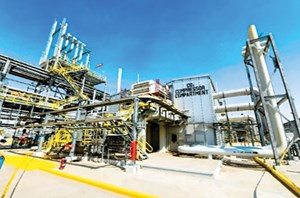Executive viewpoint
Energy companies have a responsibility to ensure the long-term health of our planet. This has never been more apparent, given the pressing need to reduce CO2 emissions and make meaningful progress in combatting climate change.
A new era. However, the increasing appetite for cleaner fuels does not spell an end for the oil and gas industry. At Aramco, we believe it heralds a new era of innovation for the sector, which must strike a successful balance between environmental management and business performance. For us, the conception and development of technology that ticks both of these boxes make perfect sense and we are doing it through our sustainability efforts.
Sustainability through circular carbon economy. Sustainability is becoming increasingly important to Saudi Aramco and the global oil and gas industry. More than ever the long-term survival of the industry depends on finding sustainable solutions that reduce our carbon footprint. Recently, energy ministers from the G20 group of leading economies have endorsed the circular carbon economy (CCE) approach to manage and reduce national and global GHG emissions.
Aramco’s Exploration and Petroleum Engineering Center–Advanced Research Center (EXPEC ARC) has established a new energy sustainability initiative focusing on reducing the carbon footprint and intensity of our operations. It adopts the circular carbon economy framework and its 4 pillars: reduce, reuse, recycle and remove. The sustainability initiative is being built on three key enablers: advanced materials, digital technologies (4IR) and proximate collaboration. These enablers will help develop and incorporate new technologies to ensure long-term sustainability, increase operational efficiency and profitability, and reduced environmental impact through lower carbon emissions. One concrete example of this effort is the deployment of Carbon Capture, Utilization and Storage (CCUS) and CO2-EOR project that is sequestering CO2 emissions while, at the same time, increasing oil recovery, Fig. 1. We have also made progress in blue ammonia, which has the potential for zero-carbon power generation.
Water management. Another important focus for us is the development of sustainable water management technologies. Given Saudi Arabia’s limited freshwater resources, the government and Saudi Aramco are taking steps to address this in partnership with the United Nations Development Program, through the Saudi National Water Strategy 2030. Our produced watercuts are one of the lowest in the world and that is my no means by luck. It is a result of our best management practices, water-control and conformance technologies that have been developed in-house, and some deployed for the first time in the world. Our new Zero Liquid Discharge (ZLD) water management solution, which won the World Oil Award for the Best Water Management Technology, is a good example of the kind of technology that the industry must develop and adopt going forward. It allows water produced as a by-product of the oil extraction process, together with other reject water streams, to be treated, recycled and reinjected for waterflooding, leading to reduced costs and minimizing wastewater disposal. Put simply, these advancements promote better use of water resources by conserving water, recycling produced water, recovering higher volumes of oil, and reduce CO2 emissions.
Technological innovation has been a key to achieving our ambition and, at EXPEC ARC, we are developing many technologies that support our efforts to increase hydrocarbon discovery and recovery in a sustainable manner. In fact, 11 of the 13 Aramco shortlisted technologies at the recent World Oil Awards were developed by EXPEC ARC. The ingenuity and innovation of our research teams reflects the company’s focus on the responsible deployment of new solutions that support our goal to be the world’s largest integrated energy company for decades to come. In 2020 Saudi Aramco was granted 683 patents—one of the highest among all the major oil companies. The ingenuity and innovation of our research teams reflects the company’s focus on the responsible deployment of new solutions that support our goal to be the world’s largest integrated energy company for decades to come.
A bright future. Despite a difficult 2020 and the anticipated growth of renewables, it is widely expected that demand for oil will recover in 2021—to 97.2 MMbpd, according to a recent International Energy Agency forecast.2 We anticipate that growth in petrochemicals, rising energy demand in the developing world, and ongoing reliance on conventional transport fuels will continue to drive oil demand over the long term. The company is determined to meet this demand, and to do so using sustainable technology that helps foster a clean energy society.
REFERENCES
- https://www.bloomberg.com/graphics/2019-countries-facing-water-crisis/
- https://www.iea.org/reports/oil-market-report-october-2020



